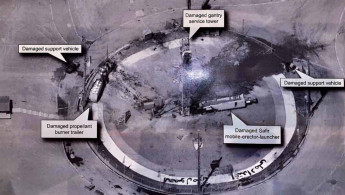US imposes fresh sanctions on Iran space agency over launchpad explosion
The US imposed sanctions on Iran's space programme, on Tuesday, saying that a recent explosion on a launch pad was a sign of missile work.
"The United States will not allow Iran to use its space launch program as cover to advance its ballistic missile programs," Secretary of State Mike Pompeo said in a statement.
"Iran's August 29 attempt to launch a space launch vehicle underscores the urgency of the threat," he said.
The US has imposed sanctions on the Iran Space Agency and two affiliated research centres, Pompeo said.
Under the sanctions, all US citizens and residents would be held criminally responsible if they interacted with Iran's space programme.
The new designations, Pompeo said, should "serve as a warning to the international scientific community" that "collaborating with Iran's space programme could contribute to Tehran's ability to develop a nuclear weapon delivery system".
President Donald Trump on Friday posted a tweet showing a high-resolution picture pointing to damage at a satellite launch pad in Iran.
He said the US had nothing to do with the damage. Washington has widely been reported to have used clandestine means to set back Iranian military development.
The tweet gathered wide attention not only for Trump's denial but due to speculation the president had used his favourite medium to publicise US intelligence that was likely classified.
Iranian government spokesman Ali Rabiei on Monday confirmed an explosion at a satellite launch pad in the country's north, blaming a technical fault.
"The explosion was in the launch pad and a satellite had not yet been transferred there," Rabiei told state television. "Fortunately, nobody was killed in this incident."
In a final bid to keep the 2015 Iran nuclear deal alive, France on Tuesday said it could offer Iran a $15 billion lifeline, if the US agrees.
Foreign Minister Jean-Yves Le Drian said the credit arrangement would see Iran receive $15 billion until the end of the year.
This would be in "exchange [for] a credit line guaranteed by oil in return for, one, a return to the JCPOA (Iran nuclear deal) ...and two, security in the Gulf and the opening of negotiations on regional security and a post-2025 (nuclear programme)", Le Drian said, according to Reuters.
"All this (pre)supposes that President Trump issues waivers."





 Follow the Middle East's top stories in English at The New Arab on Google News
Follow the Middle East's top stories in English at The New Arab on Google News

![Israeli forces ordered bombed Gaza's Jabalia, ordering residents to leave [Getty]](/sites/default/files/styles/image_330x185/public/2176418030.jpeg?h=a5f2f23a&itok=_YGZaP1z)
